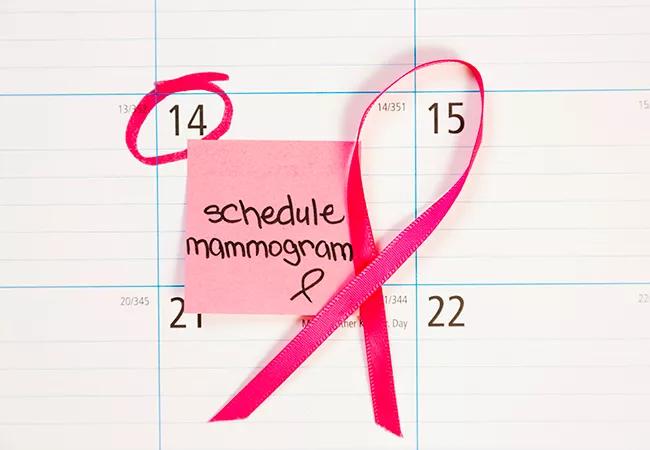When the COVID-19 pandemic delayed patient care, automated bulk ordering for overdue screening mammograms led to an easy, convenient online scheduling process.

It’s no secret that early detection of breast cancer saves lives.
Advertisement
Cleveland Clinic is a non-profit academic medical center. Advertising on our site helps support our mission. We do not endorse non-Cleveland Clinic products or services. Policy
The American College of Radiology estimates that mammograms have helped reduce breast cancer mortality in the U.S. by nearly 40% since 1990. In fact, a mammogram is the only test shown to reduce breast cancer deaths. And detecting breast cancer early is when it’s most treatable and improves survival rates.
“When talking with a patient during an office exam, we discuss their current health, concerns and review preventive care options,” explains Eric Boose, MD a family medicine physician at Cleveland Clinic. “This is a valuable conversation that identifies overdue tests. It’s in that moment that I place the necessary orders, including a mammogram.”
The COVID-19 pandemic changed that process.
Dr. Boose continues, “The pandemic led to a sharp decline in office visits. Patients were delaying routine care, which I understand, but the concern is what’s being missed? On top of that, once the stay-in-place order was lifted, there was a huge patient backlog to accommodate.”
While technology advancements over the last several years have simplified the ordering process, Dr. Boose, who serves as Associate Chief Medical Information Officer, knew there was potential to expand these improvements.
The initial step started in April 2021 for patients with screening mammogram orders and using Cleveland Clinic’s electronic patient portal. These patients received a “scheduling ticket” that allowed them to view open appointments and select the best date, time and location. Within just a few months of go-live, nearly 13,000 appointments were scheduled via the new process, which is approximately 38% of the total mammogram appointments scheduled in all of 2019.
Advertisement
With this proven approach, Dr. Boose worked with Information Technology Manager Jennifer Zarzecny to find an online solution that would expand patient care.
“We were exploring options that would remove any barriers to getting care,” says Zarzecny. “That search led us to automating the scheduling process that would eliminate the need for an in-person visit or even a phone call to their provider.”
Dr. Boose continues, “This created a nice mixture of automating orders for the appropriate patients, while giving them easy access to scheduling at their convenience, even when it’s 3 am.”
Limited access can often compromise the value of convenience. Preventing this frustration involved ongoing conversations with several teams to get their input and to address concerns.
“Before we undertake any project of this magnitude, it’s imperative to talk with stakeholders to gather feedback, so we understand the potential impact to their practice, such as access constraints.” Dr. Boose adds, “It was gratifying to quickly learn that our colleagues were in favor of this approach as they too shared our concern of women missing their routine mammograms.”
With consensus reached, Zarzecny and her team tackled the technical components. This involved consolidating various order templates to build the automated bulk orders and the online scheduling functionality.
Zarzecny explains, “Even with the order templates built, part of our planning focused on managing the volume. Over 50,000 scheduling tickets would be sent the first week of go-live. We were mindful of how much activity that would create and the impact on our caregivers, patients and the electronic patient portal.”
Advertisement
In the first week of launching bulk ordering for screening mammograms, 54,217 scheduling tickets were sent, resulting in 2,770 scheduled appointments.
Bulk ordering for overdue screening mammograms occurs weekly.
“This automated process keeps us on top of patient care.” Dr. Boose adds, “We can follow-up when there are abnormal results. There’s also been a noticeable decrease in patient calls to schedule their mammograms.”
The initiative’s success is attracting other specialties to consider automating a similar process for their patient population.
Zarzecny sees the progress: “Our Women’s Health Institute colleagues are interested in offering the same scheduling approach for their patients with overdue mammograms. We’ve also been asked to look for an automated solution to remind patients to schedule routine exams with their primary care provider. Technology brings a lot of potential to boost preventive care and empower patients to take action.”
“Our patients definitely appreciate the convenience, including discovering mammogram services right in their backyard,” says Dr. Boose. “Patients may even get their results before they get home.”
Zarzecny shares, “I received a notification to schedule my mammogram; it’s was very easy and convenient. It’s rewarding to see your efforts become a reality.”
Since July 2021, more than 76,000 screening mammogram appointments have been scheduled online.
Advertisement
Advertisement

Automating routine medical coding tasks removes unnecessary barriers

Digital “tripwires” detect and respond to malicious activity, boosting cybersecurity maturity

Effective provider training strategies incorporate multi-modal delivery

Thoughtful collaboration, data-driven decisions and effective change management lead to significant savings

A thoughtfully designed program to elevate participants’ leadership potential

Clinical input is integral to technology implementation and adoption strategy

Advancing technology makes informatics expertise essential

Integrating technology is more than product delivery